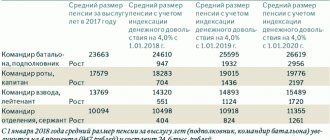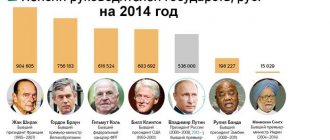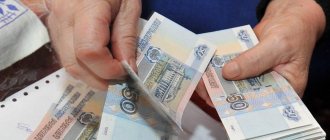According to the Crimean newspaper,
“I contacted the Pension Fund of Yalta, they answered that my pension is not increasing, it’s not supposed to. I don’t know the laws, I ask you, help me find the truth,” Nikolai Nikolaevich writes to the editors of the Crimean newspaper.
The second letter is from Imilia Alekseevna Sarycheva from Alushta. The pensioner asks for a detailed explanation of what a “saved” and “Russian” pension is, to which all the allowances go. When her pension was transferred from hryvnia to rubles, it amounted to 8,741 rubles. In February, Imilia Sarycheva turned 80 years old, and she asks whether there will be an increase and in what amount.
Specialists from the branch of the Pension Fund of the Russian Federation for the Republic of Kazakhstan gave clarification on this matter.
First of all, they remind you that the amount of pensions assigned in accordance with the legislation in force in the territories of the Republic of Kazakhstan and Sevastopol were recalculated from January 1, 2020 in accordance with the legislation of the Russian Federation on the basis of payment case documents without a declaration.
If, as a result of such recalculation, the amount of the “Russian” pension does not reach the amount of the pension paid as of December 31, 2014, then the pension is paid in the same, higher amount. In this case, the saved pension amount is not subject to annual adjustment (indexation). Until the “Russian” pension, taking into account all the provided increases, does not exceed the retained amount, the pension will be paid at the higher retained amount.
From the day a pensioner reaches the age of 80, an increase in the fixed payment to the “Russian” pension is established in an amount equal to 100% of the amount of the fixed payment to the insurance pension. Taking into account the above, the size of the “Russian” pension of Imilia Alekseevna Sarycheva from the day she reaches 80 years of age will increase by 5334.19 rubles. (amount of fixed payment to the old-age insurance pension from January 1, 2020). The amount of increase in the payment of her pension will depend on how much the newly established amount of the “Russian” pension exceeds the retained amount of the pension.
Okolelov Nikolai Nikolaevich has a similar situation. Since the amount of his old-age insurance pension, calculated under Russian law, does not reach the amount of the pension paid to him as of December 31, 2014, the payment of the pension continues at the higher retained amount.
At the same time, the “Russian” size of pensions of all pensioners is indexed in accordance with current legislation. And as soon as, as a result of indexations, the size of the “Russian” pension exceeds the saved amount, the payment will be made in a higher amount.
Many people are interested in what pensions are now in Crimea. There are more than 700 thousand pensioners on the peninsula, which is 1/3 of the total population of the peninsula. In almost every family there are people who, being citizens of Ukraine, received a pension of 5.6 thousand rubles and know that it is unrealistic to live on that kind of money.
They carry on the old life
It’s unlikely that they imagined that life would play such a cruel joke on them that at the end of their days they would not only have to raise their grandchildren, but also spin around, saving every penny. They have honestly worked for decades in production, at school, and in agriculture. But the state did not offer them a decent life in old age in return for their efforts.
Article on the topic: Medicines and kefir
Money goes down the drain
“In Soviet times, teachers were respected more than they are now,” says Tver pensioner Raisa Zhdanova . “And now I tell my grandson that under no circumstances should he go to work at school.” When I finished my career, my salary was 15 thousand rubles. But teaching is hard labor!
Raisa Vasilievna is 78 years old. For half a century she worked as a German language teacher at the Glebovsky secondary school in the Rzhev district. She retired three years ago. Now the pensioner receives 18 thousand rubles.
A former teacher lives in a dilapidated house with stove heating. The worst time of the year for her is winter. A cart of firewood costs 7 thousand rubles. For the cold season you need three of these. Compensation for utility bills for a veteran of teaching labor is only 1,500 rubles. per month. So the pensioner cannot afford firewood - it turns out that her entire pension will literally go down the drain. Therefore, for the winter, her son takes her to his city.
Article on the topic
Why are pensions being reduced? 3000 rub. spends on medicines, and sometimes even on paid clinics. In state clinics, old people are often forced to content themselves with the phrase: “You are no longer 40. What do you want?” That's all the diagnosis and treatment is.
There is no meat, expensive sausages, smoked meats, overseas fruits or other delights on the woman’s menu. Chicken, cheap pollock, half a loaf of bread for two days - bread in the countryside is more expensive than in the city. With each pension he tries to replenish his supply of cereals, sugar, and canned food. As a result, he spends 5,000 rubles on groceries. per month. Saves the garden, where there is still enough strength to grow vegetables and potatoes.
The minimum set of household goods for a month is minus 500 rubles. from the budget. About 3,500 rubles, as the pensioner says, “go through our fingers”: one thing is needed, then another. The total amount of expenses is 15,000 rubles. There is no entertainment in the village. This means there is no spending on them. So another 3 thousand can be put aside for a rainy day.
Erased from life. Why is growing old scary in our country? More details
On the pasture
A resident of the Karelian village of Chalna, Nina Aleksandrovna, worked for 30 years at an enterprise that provided telephone communications to several forest villages, enterprises, and social institutions. On the eve of retirement age, it was reduced, replacing it with a computer. Over these 30-plus years of experience, Nina Aleksandrovna earned a pension of 14 thousand rubles. You have to save on everything: 2000 rubles. goes to utilities, the rest goes to food. Once a year, 10-15 thousand must be spent on firewood.
— We still have enough for everything we need, because my husband also receives a pension. We grow all the vegetables in the garden and make twists for the winter. In summer and autumn we collect mushrooms and berries in the forest and freeze them. Sometimes it is possible to sell if the year is fruitful.
Pensioners have not gone on vacation for a long time. They don’t even remember what the sea is. For some major purchase they save for a year.
Article on the topic
Where does pension money go?
And Sergei Stepanovich and Natalya Anatolyevna, at over 70 years old, are also sending “tranches of money” from Budennovsk to children in Moscow - they still won’t get back on their feet. How do two pensioners with incomes of 12 and 13 thousand rubles manage? help Muscovites? They do not go to doctors - neither paid nor free. They “prescribe” medications to themselves, spending from 500 to 1000 rubles on them. per month. They spend about 300 rubles on food. in a day.
— How many stores will you go to to find a cheap product on sale! - says Natalya Anatolyevna. - But look: there are 100 rubles. I saved, here it’s 200. We save on utilities: we spend two cubic meters of water for two. Energy-saving lamps were installed. True, in winter it still costs 7 thousand rubles for heating.
The old people eat sparingly: porridge, chicken soups, sometimes sausages. Fruits include apples and bananas; fresh vegetables are eaten only in summer. Clothes and shoes have been worn since the days when people went to work.
Article on the topic
“This is a poverty benefit.” Expert on pensions in Russia
Rest - on the porch
In Soviet times, people went to the Kola Peninsula to buy long rubles. And Viktor Golinkov was born in Murmansk, served in the army here, and lived his entire life in the Arctic.
— Today, my wife and I live together in a three-room apartment in the village of Revda; we spend almost 8 thousand rubles a month on utilities. (Utility costs in the Murmansk region are among the most expensive in the country, they eat up almost a third of the income of old people. - Ed.) But the pension is enough for us, I’m not complaining! — Viktor Pavlovich says with a smile. — Now they pay me a little over 30 thousand, before I was 80 it was under 20 thousand rubles. Then they added for old age and disability. I will soon be 82 years old, and my wife turned 80 the other day. We don’t drink vodka anymore - we don’t need it! We don’t go on vacation either—sometimes I just go out onto the porch to get some air. But a lot of money is spent on medicines: for two people it’s about 7-8 thousand a month. But we also manage to help our grandchildren!
The ability to make do with the bare minimum, denying oneself the pleasure of eating well and dressing normally, is a common way of life for our pensioners. Alas, living poorly has become the habit of a working person.
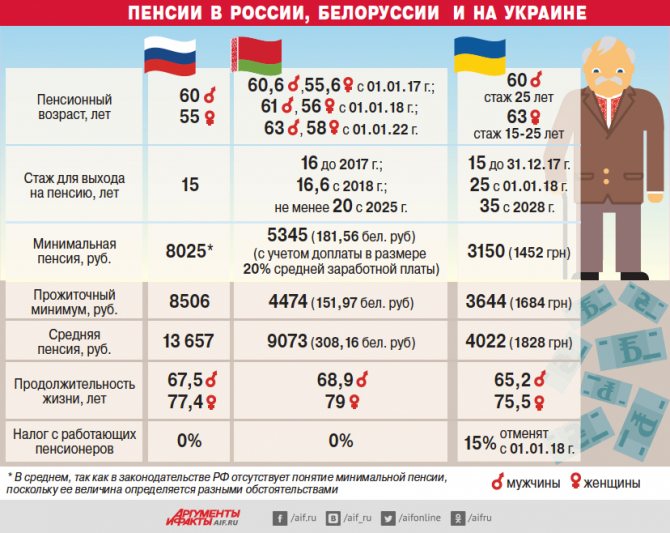
Click to enlarge
When will the state protect working people?
How can we ensure that the old-age pension ceases to be so humiliatingly small? Possible solutions to the problem were outlined by a professor at the Moscow Law University. O. E. Kutafina Elvira Tuchkova :
— In our country, pensions are low because people receive small salaries. This is the root cause! If average monthly earnings were at the European level of 100-150 thousand rubles, then the contribution to the Pension Fund in the amount of 22% of such amounts would be significant. What can you “pinch off” from earning 10-20 thousand rubles? Pennies! To make pensions worthy, wages must be increased.
Another way is to increase the insurance premium to 28%, as was before. But will the capitalists allow this? As soon as the question of increasing contributions is raised, businessmen immediately begin to blackmail the state: they say, then we will leave the market altogether. And the state stands up to protect business, not the working person. And how this person will live out his life later, when he will no longer be able to bring them profit, is of little concern to the capitalists. They prefer not to remember the basics of social insurance, which were invented in Germany back in the second half of the 20th century, and that contributions to social funds are wages lost by the employee, which should be returned to him upon the occurrence of an insured event such as old age.
In 1952, the 102nd Convention of the International Labor Organization “On Minimum Standards of Social Security” was adopted, which established: the level of pension coverage cannot be less than 40% of a person’s lost earnings. This is an international standard. 65 years have passed, and we still have not ratified the convention because we cannot guarantee even the minimum replacement level of 40% for pensioners.
Article on the topic
Who will lend a shoulder to whom?
What did the reforms achieve?
We carry out pension reforms with enviable consistency, but pensions remain low. Moreover, people cannot even calculate the size of their future pension. They recognize it only when they come to register it, and are amazed: “Why so little?”
I believe that the pension law of 1990 (of which I was one of the authors and which was in force until 2002) was the most understandable and transparent from the point of view of calculating pensions. A man had to work for 25 years, a woman - 20. For each additional year of service, the pension increased by 1%. Its size was calculated depending on the salary - you could choose the average for any 5 years of continuous service or 2 years before retirement. And any person could calculate in advance what they would have to live on in old age.
However, the new law of 2002 canceled the pension rights previously earned by citizens, and all pensioners received a minimum wage of 4.5 thousand rubles. It was a crime. It’s good that 10 years later the state admitted the mistake and carried out valorization - recalculated those who worked before January 1, 2002. For some, pensions increased by 30%. Pensions for “new” pensioners began to be calculated according to a new scheme. People, even with high incomes and extensive experience, can now count on pensions of a maximum of 15-17 thousand rubles. Those who had low rates will receive 7-8 thousand rubles. This is why people continue to work even in old age. This does not come from a good life. But here the state gives them another “gift” - it cancels indexation for those who work. And why on earth?! People pay taxes, pay for their pensions through social contributions and increase the income of the Pension Fund. Moreover, the August recalculation was also essentially canceled for them - working pensioners now began to receive an increase of a maximum of 3 points, which is equal to a ridiculous 200-240 rubles.
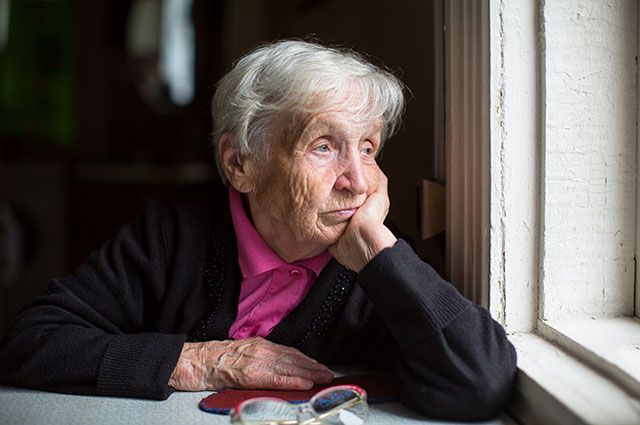
A pension with a catch. How people can lose their earnings when they go on vacation Read more
Will there be even less money?
If the 2002 law crossed out what people had earned before, then the new one, 2020, has completely confused everything. Formally, it doesn’t seem to have changed anything - there are insurance premiums, length of service and salary are taken into account. But the new formula contains a mechanism that will lead to a gradual reduction in the level of pension provision. Count for yourself: for each year of work you earn a certain number of pension points. Where do they come from? Your annual earnings are divided by the “limit of an individual’s income for calculating insurance premiums.” This value is set annually by the government, and it is constantly growing. In 2020 it was equal to 711 thousand rubles, in 2020 - 796 thousand rubles, in 2020 - 876 thousand rubles. But how many people's salaries are growing at the same rate? Let's say your salary is 30 thousand rubles. per month, for a year you receive 360 thousand rubles. In 2015, with this income, you earned 5 points, in 2020 - 4.5 points, and in 2020 - only 4.1 points. The actual numbers are even lower, because reduction factors are still in effect. And only from 2021, by earning the “limit value”, you will be able to receive the maximum number of points in a year - 10. But the trend is clear: with the same income, you will earn fewer and fewer points every year. This is the first one.
Second: what will these points be multiplied by? Their price will be determined by the government in the year of your retirement. The cost will be influenced by the economic situation in the country and the number of insurance premiums collected. At the same time, the number of pensioners in the country is increasing, the number of workers is decreasing, and many still do not pay into the general pension fund because they work illegally. All this does not help to ensure that the price of the point is high and you can count on a large pension in the future. The new pension formula leads to a sad result: whatever pension the state wants to give you, that’s what it will give you.

Why do officials have larger pensions? More details
What pension do working pensioners receive?
If a person works, this does not affect the size of his pension in any way. But indexation will not be carried out in relation to his pension; if the size of the pension is higher than the subsistence level in the region, he will not be paid the FSD. As soon as a person terminates his employment relationship, he immediately acquires the right to receive these payments.
Every year on August 1, we recalculate the pensions of working pensioners. We do this without any declaration; working pensioners do not need to come to the pension fund authorities or bring any additional documents.
In total, there are 102 thousand working pensioners in Crimea.
Was it possible to live on a Soviet pension?
Ex-director of the Research Institute of Statistics of the Federal State Statistics Service Vasily Simchera - about pensions in the USSR.
— In the pre-perestroika Soviet Union, living on a pension was twice as easy as it is today. One Soviet ruble is equal to approximately 100 current rubles. But the circle of pensioners was limited then: pensions were not given to everyone (almost like in today’s China, where 2% of the population receive pensions today).
In 1940, there were only 4 million pensioners in the USSR, in 1960 - 21.9 million, in 1970 - 41.3 million, in 1980 - 50.2 million (today - 41 million). At the end of the history of the Soviet Union, there were 60 million pensioners, of which 12 million were collective farmer pensioners. They need to be separated into a separate group, because collective farmers began to receive pensions in 1956. The initiator of this was the reformer Alexei Kosygin, then deputy chairman of the USSR Council of Ministers. The pension of a collective farmer in 1970 was 15 rubles, and in the late 1980s - 50 rubles.
The average salary in 1970 was 122 rubles, and the pension was 34.5 rubles. In 1990, the pension was 80 rubles. with an average salary of workers and employees of 200 rubles. In addition to cash payments, one pensioner also received over 85 rubles. non-monetary benefits - free medicine, free trips to sanatoriums and resorts, free boarding houses for the elderly and disabled, and other benefits.
Question answer
Retirement age in Russia and the USSR. Information Old-age pensions were assigned to men, as now, upon reaching 60 years of age, and to women at 55 years of age. Workers and employees employed in underground work, in hot shops, as well as in other jobs with difficult working conditions, retired 5-10 years earlier. This norm is enshrined in current labor legislation.
But pensions were formed completely differently than they are now. Today, if the state did not undertake the obligation to pay you a pension, then every month the part of the money that is withdrawn from it today and sent to the Pension Fund would not be deducted from your salary. This is called the joint pension system. In the USSR, there was a different system - your salary was given in full, and your pension was calculated from state or collective farm funds. The difference is fundamental: today a pension is not the state’s, but your money, which the state is obliged to return to you in full, like any savings. The current pension system, which was borrowed from the West, was previously described as one of the “ulcers of capitalism.”
So today officials, by freezing the funded parts of pensions, delaying their indexation, returning barely half of the funds set aside in trust for retirement, are stealing not state money, but ours. They also steal from me - I am a pensioner. Every month they took 40 thousand rubles from me, in terms of today’s money, and they only paid 20 thousand of it! They stole our pension money, just like they stole people's savings in the past. Pensions are the same as labor savings, for which everyone should have an individual pension account. And then everything was poured into a common pot and now go figure it out...
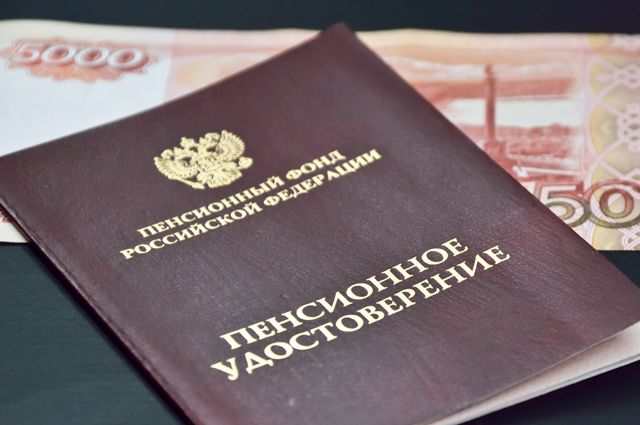
Year of the pensioner. What is behind the authorities’ decision to increase pension indexation Read more
What restrictions apply in Crimea in October 2020
There is no talk yet of closing schools and kindergartens in Crimea due to an increase in the incidence of coronavirus. All educational institutions are operating as usual, but targeted quarantine is announced in those groups where infected children or teachers have been identified.
There is no reason yet for the complete closure of educational institutions in Crimea: the morbidity situation among children remains controllable, and the epidemiological threshold in this age group has not been exceeded critically. Teachers and kindergarten teachers remain at risk, as they can catch the virus from their students who are asymptomatic.
From October 12, 2020, a mandatory mask regime will be in effect in Crimea in public transport and crowded places. By and large, no one has “allowed” residents to take off their masks since the spring of 2020, but the improvement in the epidemiological situation has contributed to the carelessness of citizens. Now, residents will not be allowed into transport or served in shops and pharmacies without personal protective equipment.
Strict quarantine and self-isolation for the entire population in Crimea are not yet planned, since strict restrictions are destroying the economy of the peninsula. But a tightening of the regime is still allowed by the authorities if the incidence continues to rise.
Why do Western pensioners live well?
How are pensions formed in developed countries, if Western pensioners can afford to live comfortably?
Article on the topic
Without hope for the state. What do Russians think about their pensions?
— Pensioners in Europe or the USA live well because the level of economic development of their countries is generally high. At the same time, Western pension systems are similar to ours, says NIFI director Vladimir Nazarov . — In most countries there is a basic part of the pension, which is paid to everyone and is aimed at fighting poverty. We call it a fixed payment, in 2020 it is equal to 4805 rubles. Almost everywhere there are insurance pensions. Italy ranks 1st in terms of contributions - employers there pay 24% of the employee’s salary fund. Russia with its 22% is in 2nd place. In other countries, contributions are much lower: in Finland it is only 18%. But due to high white salaries in monetary terms, they manage to collect much more than we do. Many countries are developing corporate pensions, when the employer makes additional contributions, and funded pensions, when employees themselves save money from their salaries. In Switzerland, a citizen contributes 4% of his earnings to savings, in Canada - 5%, in Italy and Turkey - 9%. In Germany, when a citizen retires at age 65, he receives a pension equal to 38% of his former salary. Another 13% comes from voluntary savings, and as a result, his pension is approximately 50% of his former earnings. Salaries in Germany are 2-3 thousand euros, pensions are also respectable. Spanish pensioners receive 80% of lost earnings, while Greek pensioners receive 100% or more. But, as you know, the EU is not happy with this; Greece is forced to carry out pension reform and reduce pensions.
A brief Ukrainian history of pensions for Crimeans
Today, after 2 years from the date of accession, it is possible to assess all the events that took place in the lives of Crimean pensioners, compare the size of pensions and draw conclusions about whether there are improvements in the material security of Crimean pensioners.
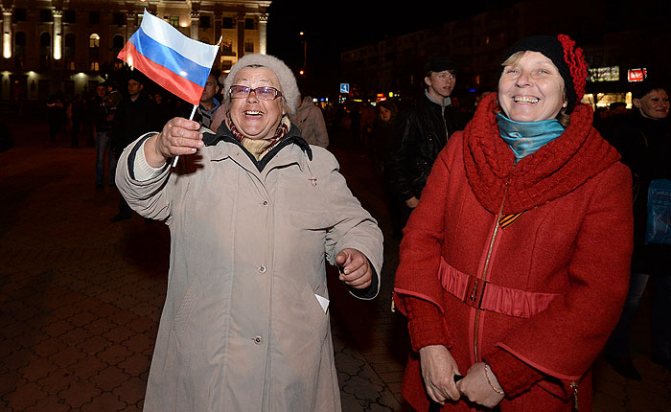
Living as part of another state, citizens received a pension established by Ukrainian legislation. Its minimum amount was $112 (3,600 in rubles). This amount was available to pensioners after the 2013 increase.
In the year of growth of the Ukrainian economy - 2014, the pension increased to 1074 hryvnia, but at the same time the dollar exchange rate jumped. The pension amount was $49 (3200). At this time, rent increased significantly (3 times).
In 2014, Crimea migrated to Russia. After reunification, pensions doubled. The increase occurred in stages, by 25%. In addition, when recalculating the equivalent from hryvnia to rubles, an increased coefficient was used.

